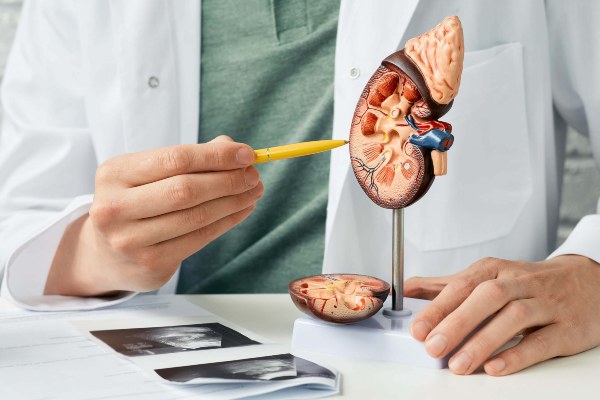Kidney stones are a common and painful condition that affects millions of people around the world. When these mineral and salt deposits build up in the kidneys, they can cause severe pain and discomfort. Some kidney stones disappear on their own, while others require medical intervention, such as surgery. This article covers various aspects of kidney stone removal surgery, discussing the type of surgery, why it is needed, and what patients can expect during and after the surgery.
What are kidney stones?
Kidney stones are collections of solid crystals that break away from the urine and accumulate on the lining of the kidneys. These stones range in size from tiny particles to as large as a golf ball. The main components of kidney stones include calcium, oxalate, and phosphorus. Factors such as dehydration, certain medical conditions, and a family history of kidney stones can contribute to development.
Symptoms and Diagnosis
Kidney stone symptoms include severe back and abdominal pain, frequent urination, blood in the urine, and nausea. If you experience any of these symptoms, it is important to seek immediate medical attention. Diagnosis of kidney stones usually involves a combination of medical history, physical exam, and imaging tests such as a CT scan or ultrasound.
Nonsurgical Treatment Options
Before considering surgery, medical professionals often consider nonsurgical treatments to help patients pass kidney stones naturally.
- Hydration: It is important to drink plenty of water to flush out stones and prevent them from forming.
- Pain Management: Medications are prescribed to reduce the pain and discomfort associated with kidney stones.
- Drugs that facilitate passage: Drugs that relax the muscles of the ureter and make it easier for stones to pass.
When Surgery is Necessary
Despite non-surgical treatment, some kidney stones may be too large or too painful to pass on their own. In these cases, surgery may be a wise option. Additionally, if your urinary tract has an infection, heavy bleeding, or blockage, surgery may be required to quickly resolve these complications.
Types of Surgery to Remove Kidney Stones
Different surgical procedures can be used to remove kidney stones, depending on the specific characteristics and location of the stone. The most common types of kidney stone removal surgery are:
Extracorporeal Shock Wave Lithotripsy (ESWL):
- Procedure: High-energy shock waves are applied to kidney stones to break them into smaller pieces.
- Advantages: Non-invasive, no incisions, minimal recovery time.
- Considerations: ESWL may not be suitable for large or very hard stones.
Ureteroscopy (URS):
- Procedure: A thin tube (ureteroscope) is inserted through the urethra and bladder to reach the stone in the ureter or kidney. The stone is then either laser-pulverized or removed as is.
- Effect: Effective against stones in the ureter or kidney. Large stones can also be treated.
- Considerations: A stent may be needed to temporarily facilitate urine drainage.
Percutaneous Nephrolithotomy (PCNL):
- Procedure: A small incision is made in the back and a nephroscope is used to remove or crush large stones within the kidney.
- Advantages: Suitable for large stones. Minimizes the need for multiple steps.
- Considerations: Generally more invasive than ESWL or URS.
Preparing for Kidney Stone Removal Surgery
Regardless of the surgical approach chosen, the patient should undergo general preparation before surgery.
- Physical Examination: A comprehensive assessment of a patient’s general health, medical history, and current medications. I’m taking it.
- Fasting: Patients are often required to fast for a period of time before surgery, as directed by their doctor.
- Surgeon Interview: An in-depth conversation with the surgeon to understand the specific procedure, potential risks, and expected outcomes.
Surgical Procedure
Actual procedure depends on the method chosen. However, the common elements are:
- Anesthesia: The patient is usually unconscious and given general anesthesia so that they do not feel pain during the procedure.
- Incision or entry point: Depending on the type of surgery, the incision is made through the back (for PCNL) or through the urethra (for URS).
- Stone Removal or Disintegration: The surgeon uses special instruments to break up and remove the stone.
Recovery and Post-Op Care
After kidney stone removal surgery, patients enter a recovery period. Recovery time varies depending on the type of surgery and personal factors. Common aspects of postoperative care include:
- Pain Management: Medications will be prescribed to treat postoperative pain.
- Hydration: Hydration is essential to prevent new stone formation and promote healing.
- Activity Restriction: Patients may be advised to avoid strenuous activity for a period of time.
- Follow-up Appointments: Periodic examinations by your health care provider to monitor your recovery and address any concerns.
Possible Complications
Surgery to remove kidney stones is generally safe, but the following complications can occur:
- Infection: Any surgical procedure carries a risk of infection.
- Bleeding: Some procedures may involve a risk of bleeding, but it is usually minimal.
- Ureteral injury: In rare cases, the ureter or surrounding structures may be injured during surgery.
Conclusion
Kidney stone removal surgery is a well-established and effective treatment for individuals with severe or persistent kidney stones. Understanding the different surgical options, the preparation process, and what to expect during recovery can help patients make informed decisions about their healthcare. As technology and medical techniques continue to advance, the outlook for individuals with kidney stones is continually improving, offering hope for a quicker and less invasive recovery. If you suspect you have kidney stones or are experiencing symptoms, consult with a healthcare professional to explore the most appropriate treatment options for your specific situation.
